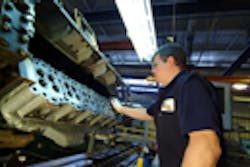To comply with emission standards that differ by country as well as to keep production costs in check, many diesel engine manufacturers are tying their global network of factories together more tightly enabling them to use a single engine platform to meet worldwide needs.
“Engines are an international business nowadays,” said Lothar Lemmermeier, head of supplier management and assistant general manager for Daimler AG’s engine plant and foundry in Mannheim, Germany.
“There’s fierce competition in the engine market, added to the demands of emissions compliance,” he noted. “As a result, we’re trying to better optimize our global production flow – standardizing processes across all our plants, worldwide, while maximizing the benefits of scale.”
To accomplish that, Daimler is creating a “synchronous factory” design to manage its far-flung network of factories – coordinating production and support between the Mannheim plant and Detroit Diesel Corp.’s facility in Redford, MI and Mitsubishi Fuso’s engine plant in Kawasaki, Japan, along with Daimler’s foundries in Capetown, South Africa and Rio de Janeiro, Brazil.
Daimler’s new HDEP global engine platform is being built via this new “synchronous” approach, said Lemmermeier – allowing the company to build just a single engine product line that can be “tweaked” to meet specific market needs, from emission standards to power ratings.
Under this new program, components are built to be shared among all the factories, rather than have each plant build entire engines specific to the markets they serve, he noted.
“For example, our Atlantis foundry in South Africa supplies 14.8 and 12.8 liter engine blocks to Redford, with Mannheim supplying camshafts and head liners for the 12. 8 unit,” Lemmermeier noted. “Redford builds the piston heads, liners, and camrods for the 14.8 liter engine – and supplies camrods to Mannheim for our 10.8 liter engine.”
Other engine makers are also engaging in similar global manufacturing strategies. International Truck & Engine Corp. and MAN Nutzfahrzeuge AG, based in Munich, Germany, for example, inked a “strategic agreement” back in 2004 to collaborate on the design, development, sourcing and manufacturing of components and systems for commercial trucks. That deal resulted in the new big bore line of MaxxForce engines for International highway trucks.
Earlier this year, Paccar announced it would build a $400-million engine plant in Missouri to manufacture 12.9-liter and 9.2-liter engines for its Peterbilt and Kenworth Class 8 trucks for the North American and global markets. These engines are based off what the company is building in Europe via its DAF and Leyland operations.
“The…facility…positions Paccar to capitalize on growing opportunities in North America, Europe and Asia,” said Mark Pigott, Paccar chairman & CEO. “It will provide the flexibility to supply products and components to Paccar facilities and customers on a global basis.”
About the Author
Sean Kilcarr
Editor in Chief
Sean Kilcarr is a former longtime FleetOwner senior editor who wrote for the publication from 2000 to 2018. He served as editor-in-chief from 2017 to 2018.
